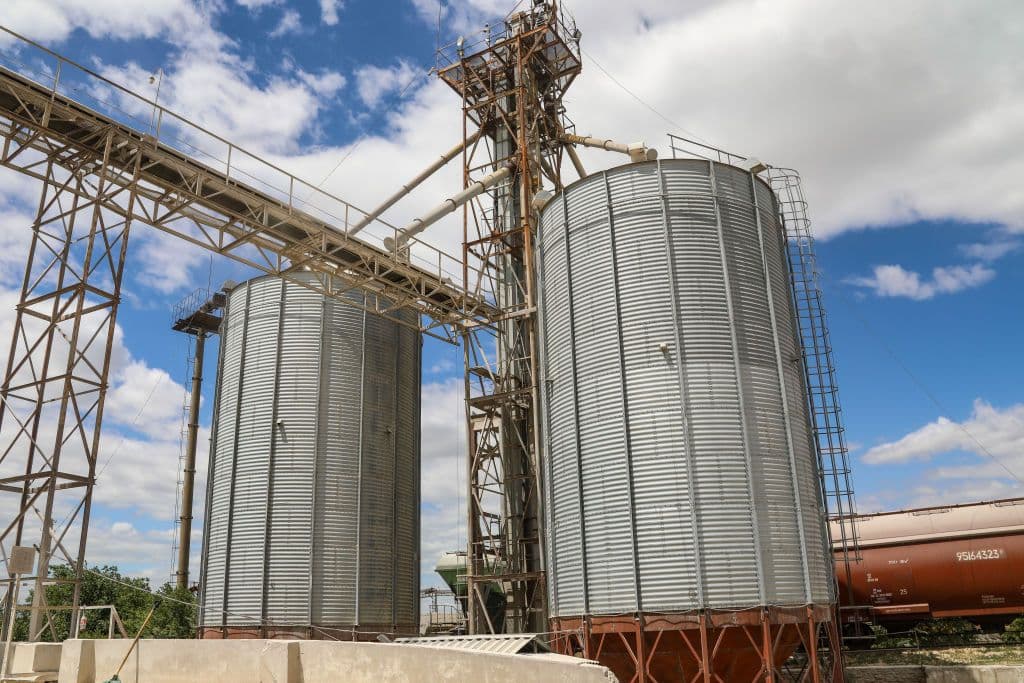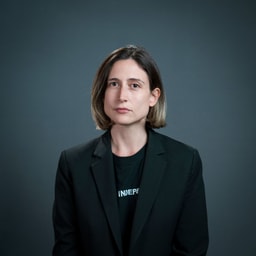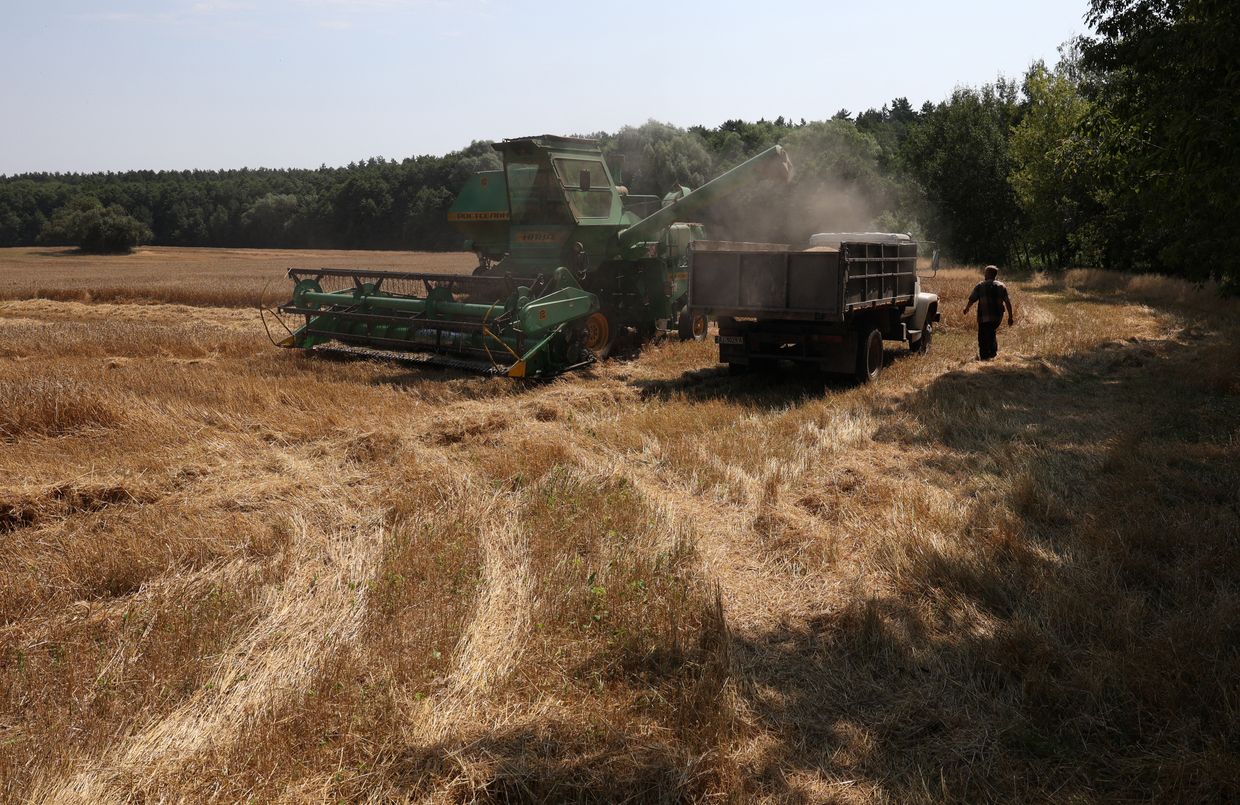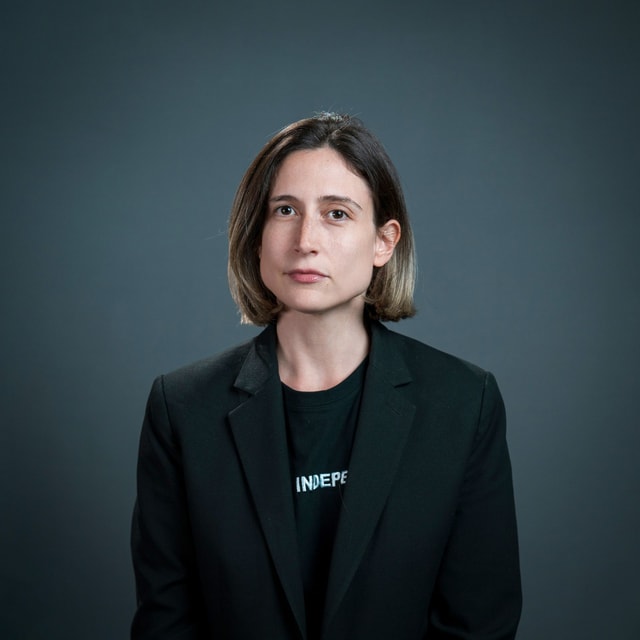This investment fund is betting on Ukraine's struggling farm sector

Get more news like this directly to your inbox every week by subscribing to our Ukraine Business Roundup newsletter.
Russia's full-scale invasion has hit Ukraine's agriculture sector in every conceivable way — from blocked ports and occupied farmland to grain theft, trade disruptions, and direct attacks.
But even as the sector struggles, Ukraine has become more dependent on it than ever before. With exports of metals, mining, and other key industries shrinking due to the war, agriculture and agrifood now account for more than half of Ukraine's annual exports and around 60% of foreign currency revenue, up from 44% in 2021, central bank data shows.
That growing dependence is both a lifeline for Ukraine's economy but also proof of its fragility as it's forced to rely on a sector that is exposed to so many risks.
Meanwhile, access to finance has dried up. Commercial banks have all but left the market, wary of the risks, leaving agribusinesses with no access to credit. Investment has been limited to domestic agricultural giants and international financial institutions focused on firms with large export capacity, where food security considerations justify lending.
That grim picture brightens a little with news of an investment fund recently launched that is aiming to fill financing gaps and get much-needed capital back into the sector, particularly to medium-sized businesses.
Ukraine-based Diligent Capital Partners and Dutch firm 2ndAries recently launched a 150-million-euro fund backed by the EU's Ukraine Investment Framework, offering both debt and equity to agrifood companies.
According to Dan Yakub, founding partner at Diligent Capital Partners, Ukraine's largest agricultural firms account for about 20% of export revenue. "The rest are smaller enterprises — so the opportunity is large," he told the Kyiv Independent in an interview.
Yakub said the fund expects to start deploying capital by the end of the first quarter of next year. Its current pipeline already stands at 500 million euros, he added, "and interest keeps growing."
The Kyiv Independent spoke with Yakub to discuss why he and his partners launched the fund now, the opportunities they see in Ukraine's agricultural sector amid the war, and their long-term vision for the country's agrifood industry.

This interview has been edited for clarity.
The Kyiv Independent: What prompted you guys to go into this investment together (with the Dutch firm) and create this fund? And why now?
Dan Yakub: First of all, the war. Many companies we had invested in were completely shut off from financing — debt or equity. There wasn’t an opportunity for companies to keep going. The lifeblood of business, loans or equity capital, wasn’t there.
During the war, it’s difficult to get into valuation conversations with companies. Sometimes it’s even offensive to entrepreneurs. So we thought there needs to be an instrument offering financing somewhere between debt and equity, where we don’t have to start with valuation.
And finally, our expertise in food and agribusiness. We’ve done a lot of deals in Ukraine — confectionery, juices, cheese, milk, wine, seeds, export infrastructure, animal feed, pet food.
Our Dutch partners were part of FMO (the Dutch Entrepreneurial Development Bank), probably the largest frontier, risky-places food and agribusiness player in the world. So we thought, we have this expertise, we should focus on the most cash-generative part of the Ukrainian economy, during the war.
The Kyiv Independent: Why did you and your partners decide to go with this particular financing tool for the investment?
Dan Yakub: It’s both for investors coming into Ukraine and for Ukrainian companies. For investors, the key is that it needs to be a partnership with a European country. That’s essential because most EU financing decisions happen at a government-to-government level.
Number two: flexibility. We can structure it as debt or as a mix of debt and equity. When we share in the upside, we become aligned with the entrepreneur.
Number three: speed. We’re based in Ukraine, so decisions won’t be made in London or the Netherlands. The core team is in Kyiv. People who understand the context, risks, and opportunities are making decisions here, which makes the fund more nimble and responsive.
The Kyiv Independent: Why Europe?
Dan Yakub: Europe is the (part of the world) most interested in Ukraine winning and being successful. Ukraine’s success matters most to Europe. Only European countries can access European financing, and only they understand how the European Commission works.
Also, many European countries have become successful in agribusiness. The Netherlands, for example, moved up the value chain — from commodities exports to finished goods and processing. That experience is important for Ukraine.
The Kyiv Independent: How will you ensure the investments end up where they’re intended to go?
Dan Yakub: There are multiple layers. First, the European Commission guarantees the investments. There will also be other reputable institutional investors. All of them care that this is a successful and safe investment.
It’s food and agribusiness — traditionally a non-monopolized or lightly monopolized sector. We’re focusing on medium-sized businesses with investments of 10–15 million euros. These are Ukrainian entrepreneurs who built their businesses from the ground up. They’re not politically exposed.
Second, partner risk. Who are we interfacing with? And here, once again, it's more of our bread and butter to understand who we're dealing with person-wise. We think, okay, we have this entrepreneur — they probably would have been in the market for some time, have dealt with multiple people, be it banks, development banks like the EBRD or IFC.
Finally, due diligence — legal and reputational. Ukraine has open registers now, so much can be done from your desk before hiring a law firm.
The Kyiv Independent: Realistically, how large is the pool of companies that are ready for investment through this fund?
Dan Yakub: More than half of Ukraine’s export revenue — about 60% — is from food and agribusiness. Large companies like Astarta, Nibulon, MHP, and Kernel make up maybe 20% of that. The rest are smaller enterprises. So the opportunity is large.
Some companies aren’t ready due to structural issues — accounting, unpaid taxes, or legal problems — but overall, the pipeline is big. Even before announcing the fund, we had a pipeline three times the fund’s size, around 500 million euros. And interest keeps growing.
The Kyiv Independent: What kinds of companies are you looking at?
Dan Yakub: The entire value chain. There are pure-play processors, integrated enterprises with farming, storage, and processing, and logistics companies in strategic locations. There’s also specialized or organic farming.
Ideally, we want value-added products — not just farming. Farming is volatile. One year can be good, another tough. That doesn't mean we won't look at farming businesses at all, but we will be more selective.
The Kyiv Independent: At least 20% of funding will go to green projects. What might that look like?
Dan Yakub: Organic farming using organic fertilizers, or processing waste — like turning waste protein into rendered protein, or waste from egg production into biomethane. Biomethane is especially relevant in Ukraine now, and there’s strong EU demand for it.
The Kyiv Independent: Is 20% realistic during the war?
Dan Yakub: Definitely. For example, solar panels at agricultural enterprises could be purchased with the use of our funds, which are becoming significantly cheaper with battery technology — also fast growing in Ukraine. Companies want energy independence — solar and battery inthe summer. Decentralizing energy is crucial now.
The Kyiv Independent: You mentioned wanting capital working in the field within months. How soon do you expect the first projects to be funded?
Dan Yakub: Realistically, by the end of the first quarter next year. There’s preparatory work — collecting information, agreeing on terms, due diligence — so it takes a few months.
The Kyiv Independent: And how long is the investment horizon?
Dan Yakub: Long-term. Up to ten years. Some projects are complex and take time to generate cash flow. We’re happy to wait longer than banks for principal repayment.
The Kyiv Independent: What’s the incentive for investors?
Dan Yakub: Their investments are guaranteed by the European Commission, which provides a backstop. Returns are relatively fixed — more like fixed income. Some investors are doing this partly to help Ukraine.
The Kyiv Independent: How do you measure success?
Dan Yakub: Making investments that yield maybe low- to mid-teens returns for investors, which would be a success regionally.
The Kyiv Independent: What could stand in the way?
Dan Yakub: War risks — like if Odesa port becomes inoperable. It's not even just the missile attacks, it's more that it's a very concentrated piece of sea that needs to be open for things to move in food and agribusiness.
A very rapid return to normal could also bring too much capital and competition. That’s a good problem to have, but it would make deals more expensive. Finally, human capacity — finding people focused on Ukraine, service providers — an outflow of those types of people or people getting tired, that would also be a risk.
The Kyiv Independent: What is your vision for Ukraine’s agricultural sector in the next five to ten years? And how do you view your fund's role in shaping it?
Dan Yakub: In five years, gradual change; in ten, transformation. It’ll be capital-intensive, not labor-intensive. We’ll move deeper into finished products — starch, processed fruits and vegetables, substituting imports.
The future is in capital-intensive projects: processing, logistics, and branded products. Ukrainian companies can succeed in global and European markets with branded products. That's where we want to be — to make (the sector) more, “fancy,” so to speak. Competing only on cost and volume will be politically sensitive in Europe.
The Kyiv Independent: Right, when people are attached to brands, it’s harder politically to block them.
Dan Yakub: Exactly. Brands are about what people want.












